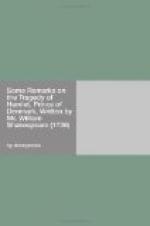His breaking from his Friends with that Vehemency of Passion in an Eagerness of Desire to hear what his Father could say to him, is another Proof of his Filial Tenderness.
The Reader of himself must easily see why the Spectre would not speak to the Prince, but a-part from those who were with him: For it was not a Secret of a Nature fit to be divulg’d. Their earnest Intreaties, and almost Force which they use to keep him from going, are much in Nature; the Reasons they give him, and the Reflections they make after he is gone, are poetically express’d, and very natural.
The Ghost’s Account of the base Murther committed on him, is express’d in the strongest and most nervous Diction that Poetry can make use of; and he speaks with such Gravity and Weight of Language as well suits his Condition. The Ideas he raises in the Audience by his short Hint concerning the Secrets of his Prison-House, are such as must cause that Terror which is the natural Effect of such Appearances, and must occasion such Images as should always accompany such Incidents in Tragedy.
The Ghost’s bringing out the Account of his Murder by Degrees, and the Prince’s Exclamations as he becomes farther acquainted with the Affair, are great Beauties in this Scene, because it is all entirely conformable to Nature; that is, to those Ideas by which we naturally conceive, how a Thing of this sort would be managed and treated, were it really to happen.
We are to observe further, that the King spurs on his Son to revenge his foul and unnatural Murder from these two Considerations chiefly, that he was sent into the other World without having had Time to repent of his Sins, and without the necessary Sacraments, (according to the Church of Rome,) as Mr. Theobalds, (See his Note, p. 253.) has well explained it, and that consequently his Soul was to suffer, if not eternal Damnation, at least a long Course of Penance in Purgatory; which aggravates the Circumstances of his Brother’s Barbarity. And, Secondly, That Denmark might not be the Scene of Usurpation and Incest, and the Throne thus polluted and profaned. For these Reasons he prompts the young Prince to Revenge; else it would have been more becoming the Character of such a Prince as Hamlet’s Father is represented to have been, and more suitable to his present Condition, to have left his Brother to the Divine Punishment, and to a Possibility of Repentance for his base Crime, which by cutting him off, he must be deprived of.
His Caution to his Son concerning his Mother, is very fine, and shews great Delicacy in our Author; as has been observ’d by a great Writer of our Nation. The Ghost’s Interrupting himself (but soft, methinks, I scent the Morning Air, &c.) has much Beauty in it, particularly, as it complys with the received Notions, that Spirits shun the Light, and continues the Attention of the Audience by so particular a Circumstance.




